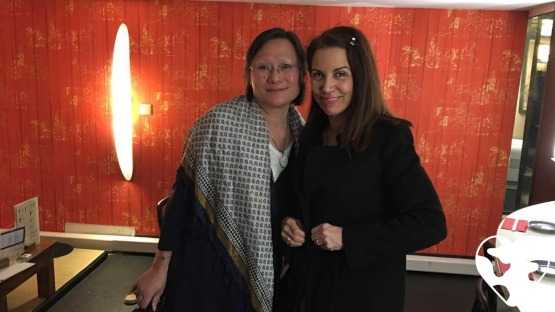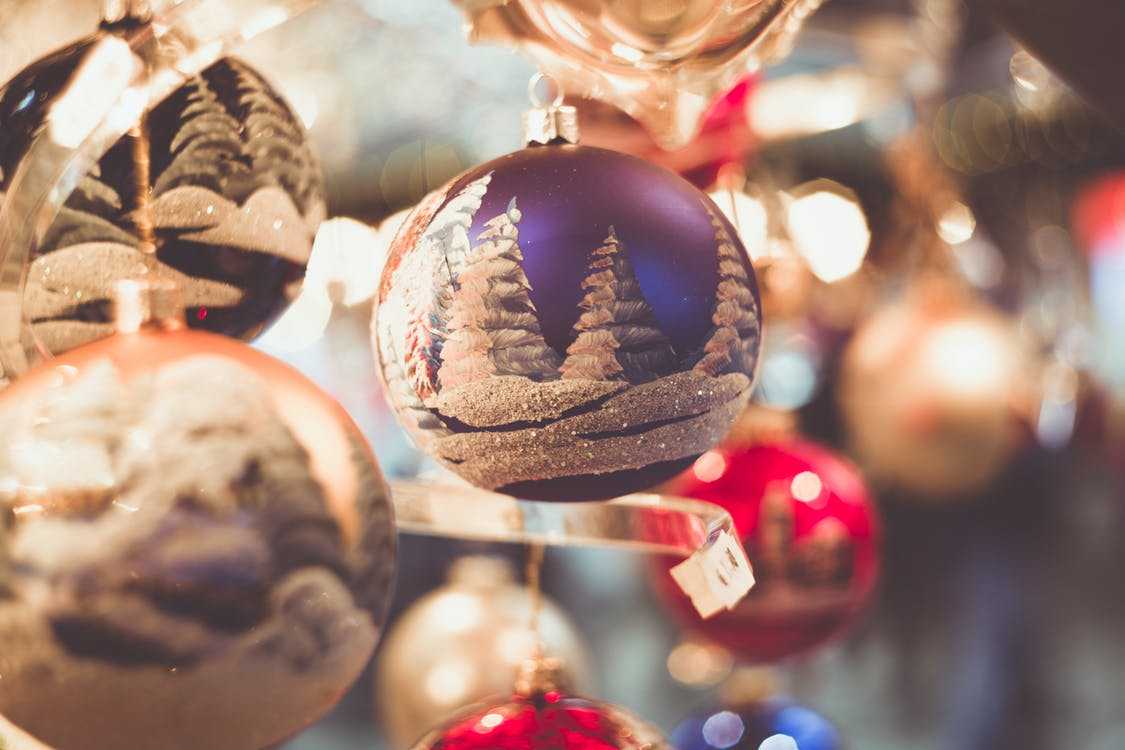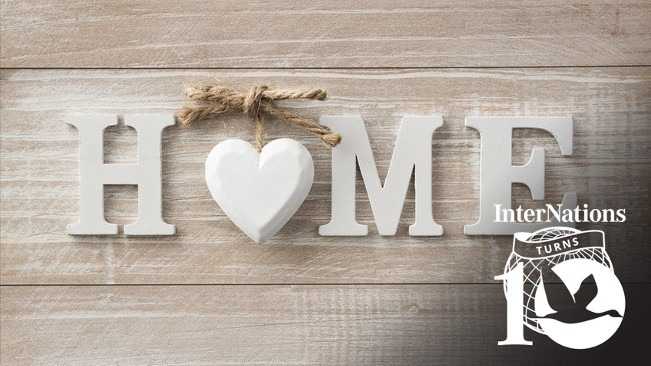Observing Holidays and Traditions Abroad
In this article series, our contributors share their experiences of spending the holidays abroad, tips on how to combat homesickness during the festive season, and their musings on their favorite time of the year.

For many expats, homesickness is the strongest each time their favorite festivities and holidays from back home roll around. More often than not, the realization of not sharing treasured cultural events with the people in their new surrounding can be tough to swallow. To alleviate this, our Expat Experiences section offers a wealth of reading material!
Scott Rousseu: The Importance of Celebrating Your Traditions as an Expat
I will never forget Christmas of my first year living in Vietnam 15 years ago. I had befriended some Europeans working for Medicines Sans Frontieres who invited me to go to the seaside with them for a few days over the holidays. On the way there they pointed under my seat to a box which they said held two turkeys. Where they found turkeys in the middle of the Mekong Delta I will never know! However, I will never forget cooking those turkeys over the BBQ (a rather unique experience in itself!), eating Christmas dinner overlooking the sea of Thailand with prawns, fish and all kinds of other delicacies, and afterwards gathering around the fire with music from a guitar and millions of stars twinkling overhead. Yes, all was well with the world.
Gabrielle Byko: How to Survive the ‘Holiday Homesick Blues’
It helps a lot to have some friends who grew up in the same place you are from (language barrier elimination aside), or with people who are just plain enthusiastic about your culture and participating in your yearly traditions. Despite many of my non-American friends’ skepticism towards pumpkin pie, everyone who I have ever invited to my Thanksgivings (from my culture or another) have always been very grateful to experience a real American Thanksgiving (which of course they have seen on television or in film) and talk about it for years to come. It certainly makes everyone feel a little warm and fuzzy inside.
Anastasia Piatakhina Giré: When Going Back Home Drives Us Crazy
Even if it takes a lot of courage to make a sense of this past experience, it is an important step for growth. The family home will not be there forever and our parents will also not be eternally around, so let’s make the most of this occasion to better understand ourselves. Re-writing the childhood chapters of our life story can be a proving but an exciting experience!
Michaela Rossi: Christmas to Remember
After becoming parents and with a young family of our own, we realised it was time to make a decision for our children. A decision that will determine ‘which’ Christmas we’re going to have and what it will mean to them. We needed to decide which Christmas events we want embroidered in their childhood memories.
In this article series, our contributors share their experiences of spending the holidays abroad, tips on how to combat homesickness during the festive season, and their musings on their favorite time of the year.

In the past few weeks our intercultural family has celebrated the Vietnamese Mid-Autumn Festival and Canadian Thanksgiving. We have also been invited by a close expat Muslim friend to celebrate Eid Al Adha with her family. Being a part of all these festivities in such a short period of time has not only been incredibly fun but has also got me thinking about how important it is to maintain your own traditions while living as an expat.
The Core of Our Cultural Being
Traditional celebrations are some of the core aspects of any culture. Whether it is a wedding, a harvest festival, a religious holiday, or a national observance, our celebrations are woven tightly into our overall cultural identity.
When we move overseas, part of the excitement of living in a new culture is exploring and joining in the celebration of the local holidays and traditions of our adopted country. Some of these experiences will provide memories that will last a lifetime.
Getting deep into the local culture is a fantastic way to adapt to your new home, but there are numerous reasons why maintaining our own cultural traditions when we move overseas is just as important.
Stay Connected
Celebrating your traditions helps keep you grounded in your own culture while adapting to a new one. This is especially important when going through some of the phases of culture shock that affect many of us in the first months after moving overseas. Celebrating one of your traditional holidays can brighten up your mood for weeks as you become absorbed in preparations for the event and the excitement of the day itself.
Celebrating a special day can also help you connect with fellow compatriots in your area who can add to your mutual support group. When we hosted our recent Canadian Thanksgiving dinner, we invited a new colleague and his family who had just spent an exhausting couple of months going through the trials of getting settled into a new job, finding appropriate housing, and jumping through the usual bureaucratic hoops that accompany any move to a new country. They were extremely grateful for the chance to wind down, meet new friends and exchange tips on local life.
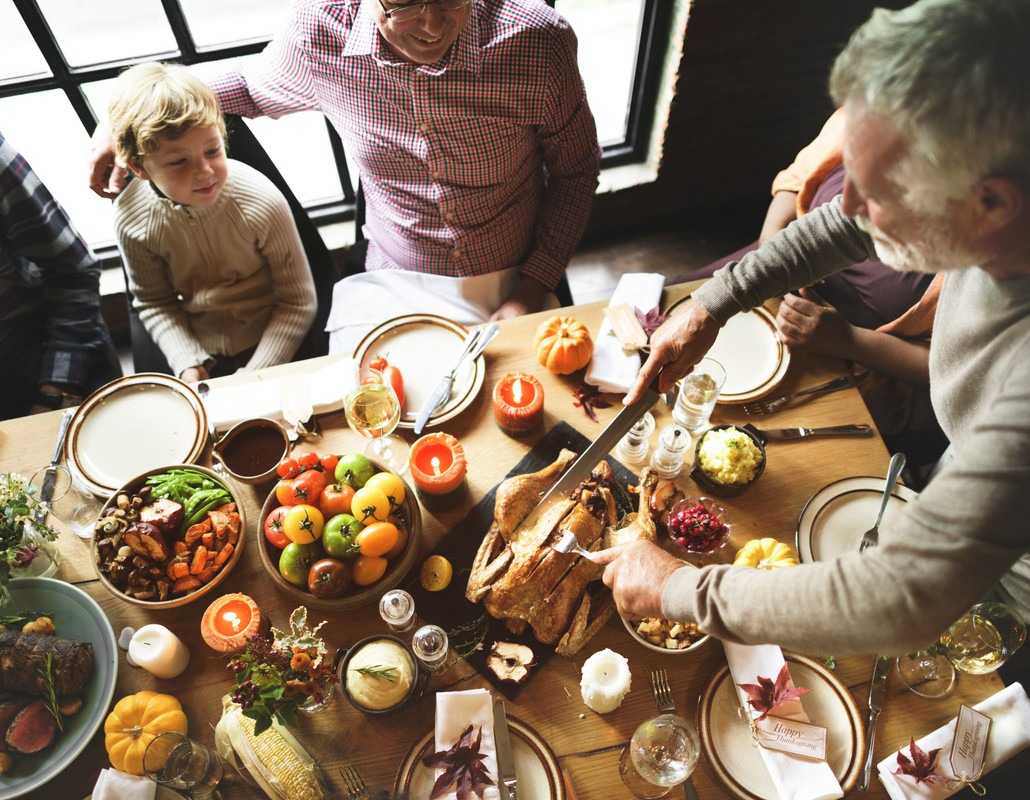
Give Your Expat Kids Some Roots
Celebrating your traditions is perhaps most important if you have expat kids growing up in another culture (the so-called 3rd culture kids). It can help them keep one foot firmly rooted in their home culture, while also offering learning experiences that might not otherwise occur. As we were preparing for our Thanksgiving dinner, our seven year old daughter was quizzing me on the differences between the American and Canadian Thanksgiving, and why one was observed later in the year than the other. I don’t think this question would have arisen in her British curriculum school classroom!
Share Your Culture
Traditional celebrations are also an excellent opportunity for intercultural exchange and understanding. Both kids and adults learn about other cultures through these celebrations. For the Vietnamese Mid-Autumn Festival, our daughter invited all her friends over to parade through our neighbourhood holding lanterns and to eat moon cake back at our place. As our rather large group of parents and children wandered along the local roads, drivers stopped to watch, ask questions, and even take pictures.
For our Thanksgiving dinner, we had two Americans, one German, one Burmese, and two New Zealanders in our midst. And when we went over to our Malaysian friend’s home to join her in celebrating Eid, there were many non-Muslims helping her celebrate this important day and, perhaps most importantly, helping her eat her amazing Malay cooking!
Experience Something Unique
Finally, observing your traditions while living overseas will give you some unique experiences that you will remember years later. I will never forget Christmas of my first year living in Vietnam 15 years ago. I had befriended some Europeans working for Medicines Sans Frontieres who invited me to go to the seaside with them for a few days over the holidays. On the way there they pointed under my seat to a box which they said held two turkeys. Where they found turkeys in the middle of the Mekong Delta I will never know! However, I will never forget cooking those turkeys over the BBQ (a rather unique experience in itself!), eating Christmas dinner overlooking the sea of Thailand with prawns, fish and all kinds of other delicacies, and afterwards gathering around the fire with music from a guitar and millions of stars twinkling overhead. Yes, all was well with the world.
So next time you see one of your traditional holidays approaching on the calendar, start planning. Invite your friends, involve the kids, and create your own lasting memories.
Written by Scott Rousseau
In this article series, our contributors share their experiences of spending the holidays abroad, tips on how to combat homesickness during the festive season, and their musings on their favorite time of the year.
Regardless of how hard I try to suppress that yearly aching feeling, just as the cool fall wind begins to blow, and Germany is busy stocking its shelves with its share of fine Christmas goodies, the same old uneasy feeling starts poking at me from deep inside. That feeling is none other than the ‘homesick holiday blues.’ Don’t get me wrong – I am no Scrooge, and it’s not that I don’t really love the holidays. There is nothing that I enjoy more than decorating my apartment with festive decorations, overindulging in Christmas baked goods and racking up my credit card bill with purchases for myself and loved ones that can be justified simple by saying “Christmas comes around just once a year…”, but the struggles of missing family and friends and even the homeland during the holiday season seems to strain even more than usual on my expatriate life. This feeling is especially worse for those of us who are single and here alone (but that’s another matter altogether).
As an American, I also find myself frustrated by the fact that some of the holidays that I so enthusiastically celebrate in the USA are plain lacking or are just none existent in Germany- i.e. Halloween and Thanksgiving. It’s a very peculiar feeling for me to go into work on the Thanksgiving Thursday and not have the day off, and even more so, know that not everyone is going to be stuffing themselves with turkey, cranberry sauce and pumpkin pie that evening. Those moments are when I feel the most nostalgic and reminisce about holidays back at home with my family.

With all of that being said, despite the homesick holiday blues that encroach, I have realized that I am far from alone with this feeling, and over the years I have come up with some coping methods which are helpful in combating this annual virus.
- Don’t be alone. Be with your expatriate “family”- it’s very important not to isolate yourself during this time- that will just make you more miserable. Go out with the friends that you do have. You will find that a lot of your other expatriate friends who can’t be home at the holidays are probably feeling the same way and as many of us know, friendships with other foreigners can blossom very fast and they become your quasi family when abroad. Spend time with them. It will do you all some good and raise the level of holiday cheer.
- Celebrate anyways – It doesn’t really matter to me anymore that Halloween is not a big deal here. If it’s important to you, dress up in a costume anyways, regardless of how old you are- well maybe you shouldn’t do this at work or in a professional setting, but on your own private time, feel free to throw a Halloween party and invite your closest friends. The same goes for any other holiday- light your menorah for each night of Hanukah, and buy a copy of those claymation Christmas movies that appear on TV every year. Sometimes just doing these small little things to celebrate makes all the difference.
- Make friends of the same culture or with those who are enthusiastic about your culture. It helps a lot to have some friends who grew up in the same place you are from (language barrier elimination aside), or with people who are just plain enthusiastic about your culture and participating in your yearly traditions. Despite many of my non-American friends’ skepticism towards pumpkin pie, everyone who I have ever invited to my Thanksgivings (from my culture or another) have always been very grateful to experience a real American Thanksgiving (which of course they have seen on television or in film) and talk about it for years to come. It certainly makes everyone feel a little warm and fuzzy inside.
- Embrace the difference in traditions – even though there might be the same holidays in your home country and your new country, the way they chose to celebrate them might be greatly different – embrace this! I will never forget my first encounter with Glühwein, the warm wine served in German-speaking and other countries in Europe, and how I was repulsed by the thought at first glance. But after some convincing of some colleagues and a mug or two, drinking Glühwein is one of the things I look forward to the most and something I try to recreate for my friends and family when I can be lucky enough to share the holidays with them. Rather than fighting your new culture, find ways to appreciate it and sooner than you know these traditions will also be added to your yearly routine, making you feel a little more at home.
However your chose to spend, or ‘deal’ with the holidays, take some time to appreciate the contributions (people, traditions, lessons, etc.) from your homeland and your new home and how they have enriched your life. We never know how much time we will be spending in a given place or how much time we have with our loved ones, but we can do our best to be thankful for every moment – at home, or abroad– and that my friends, is what genuine, jolly, holiday spirit is really all about.
Gabrielle Byko is an international communication professional who has studied and been working in Germany and Austria for the past 6 years. She has a passion for experiencing international culture exchange in all of its forms.
In this article series, our contributors share their experiences of spending the holidays abroad, tips on how to combat homesickness during the festive season, and their musings on their favorite time of the year.
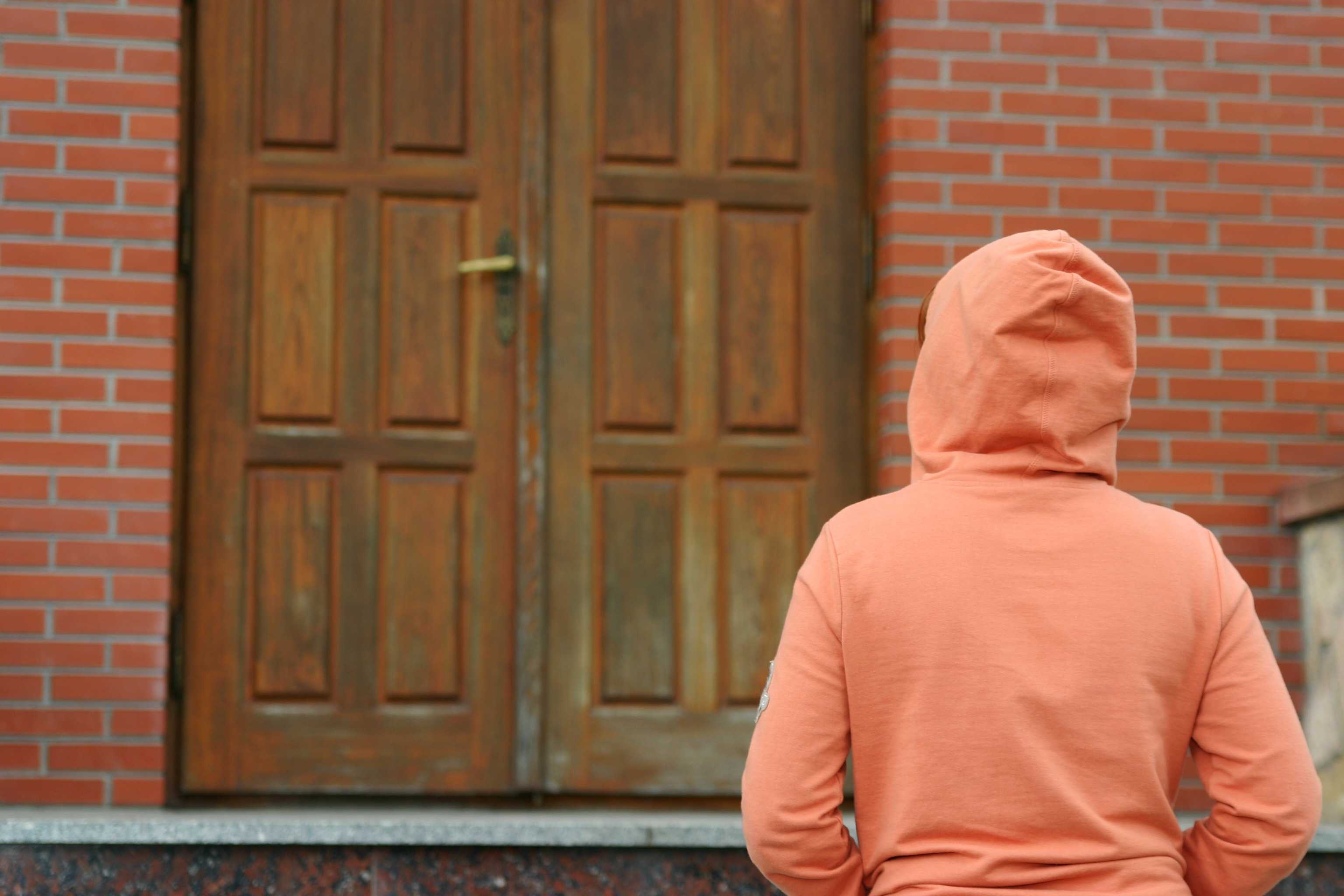
The Christmas break is approaching and we start planning our visit back home. We are buying gifts; we are feeling increasingly excited and possibly a little bit nervous. We all come back now and again. For whichever reason we left home and however long ago, it happens to us to go back for family gatherings or just for a weekend.
Do you remember sitting at a family meal and suddenly feeling eight years old? For a child, not wanting to eat your salad can raise an internal conflict between wanting to please the adults and being a “good boy/girl” and, at the same time, genuinely hating the salad. Not for an adult though. But, staring at our plate prepared by our mother, we feel exactly as if we were eight years old.
The parent’s home offers plenty of powerful triggers. The old feelings come back in a strange bunch of ghosts, feeding our nightmares. We sleep in our old room filled with well-known items, and bump into old acquaintances or family friends. Sometimes being back to our parent’s makes us feel exactly as it “should”: warm, protected, loved. But what if it doesn’t, and instead this old scenery makes us feel sad, angry or even depressed?
A Visit to the Past
We start wondering how exactly our childhood experience was. Very often we feel some dissonance between how our parents pretend it was and the version our own emotional memory suggests. We feel confused, we feel guilty for having these thoughts, and also angry and frustrated with our parents for not being able to understand, to relate to our experience. Again, an adult can eventually deal with this kind of anxiety-producing situation. But for a child it is overwhelming, and at that point we are just eight years old and powerless in front of the adults who are in charge. This regression does not help dealing with the whole family setup, eventually sending us back to the darkest places of our childhood.
At times, we all need is some form of validation for the version of reality we have experienced. We just need somebody acknowledging that it was just as we remembered it, and we are entitled to have these not-always-positive feelings about it. We are not going crazy or making things up. If we have siblings and if we are lucky enough to have a good enough relationship, we can compare our experiences. Often, it helps, and, together, it becomes easier to figure out how it was and how it made us feel.
We grew up in this place surrounded by these people. The experience of being there and being attached to them shaped our personalities. Sometimes acknowledging their powerful influence on our life feels already painful enough.
Often, for those who left home early and went away, there has been a good-enough reason for taking this decision. We all believe we were interested in exploring the world and wanted to see places. The itchy feet do exist, but very often we also had our own deep reasons to flee the place or the family we lived with. So, even if carefully hidden by ourselves and from ourselves, this emotional knowing is still present. Coming back home, even for a short stay, we find ourselves facing it all again.
It might be helpful to recognize that every family is a well-established system with its specific dynamic. Once distanced, we remain a part of its functioning. And the missing piece (remember your old puzzles?) tends to become the most figural and somehow important. Coming back, even for a short time, we tend quickly to fit in the same place we used to occupy or the role we used to play in the system.
Will our parents be able to accept our partner? Will he fit in this world? Will they be able to relate better to our children than they did to us? Will they validate our recent decision to, for example, divorce or to change career? Their potential expectation and judgement flows in the air, and we cannot avoid feeling somehow contaminated by it.
Growing with the Experience
Very often, my clients report eating too much whilst spending holidays at their family home. Even for those who are not prone to binge eating, it becomes difficult to avoid the kitchen. Filling ourselves with homemade food (the Bridget Jones’ turkey curry!), even truly delicious, can be a way of avoiding some deep emotional truth we are not ready to meet. So, we come back to our lives swollen, unhappy and emotionally exhausted.
It can be a painful experience to look back, especially when we learnt so well to set fire to bridges and to keep moving on, or just to move around. Even if it takes a lot of courage to make a sense of this past experience, it is an important step for growth. The family home will not be there forever and our parents will also not be eternally around, so let’s make the most of this occasion to better understand ourselves. Re-writing the childhood chapters of our life story can be a proving but an exciting experience!
Some useful tips to bring back home:
- Listen to yourself. Acknowledging the existence of our particular emotional response to being at home is already a good step forward.
- Share with friends or siblings how you are feeling. Look for validation of your experience.
- Try to not respond to parents from your eight-years old, but rather from the adult you have become in the meantime.
- Once back, reflect on the experience and make sense of your emotional responses to the family visit.
Anastasia Piatakhina Giré is an integrative psychotherapist practicing in Madrid, and also worldwide through Skype.
In this article series, our contributors share their experiences of spending the holidays abroad, tips on how to combat homesickness during the festive season, and their musings on their favorite time of the year.
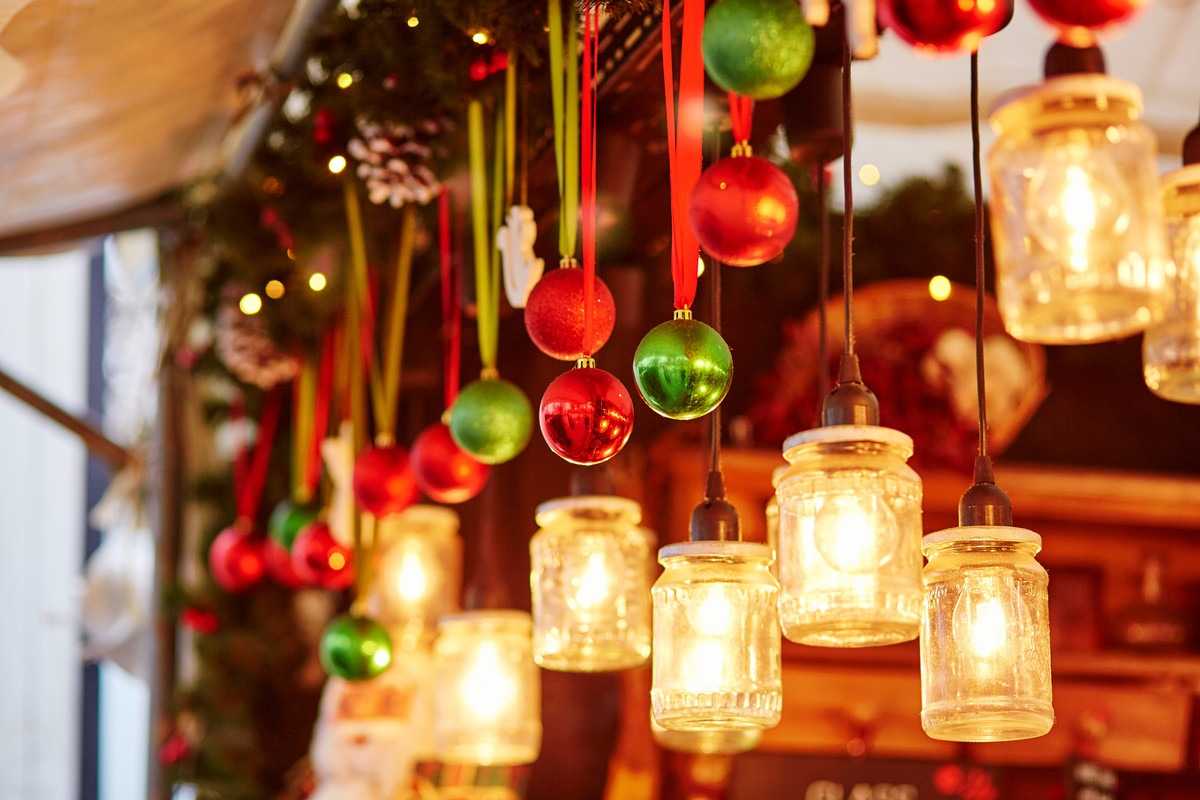
Coming from different backgrounds, my husband and I never used to worry about keeping our cultural traditions going, and about where we are going to be at time of festive seasons. We weren’t that fussy about what country we were going to spend it in either and happily went with the flow each time, wherever we went.
After becoming parents and with a young family of our own, we realised it was time to make a decision for our children. A decision that will determine ‘which’ Christmas we’re going to have and what it will mean to them. We needed to decide which Christmas events we want embroidered in their childhood memories.
Deciding on the Future Family Tradition
Will we want them to remember that Christmas is on the 24th, and that in true Czech tradition, the most important meal on that evening consists of a carp which had been living relatively happily in the family bath for the last two days, and potato salad? Or will it be an English Christmas, with stuffed turkey served on the 25th at lunchtime? And who is going to be bringing their presents: a white-bearded Santa? A Czech St Mikulas and Infant Jesus? Or will it be the Italian Befana or the Spanish Three Kings?
Our approach is usually one of ‘when in Rome do as the Romans do’, so yet again we decided to ditch ‘our own’ traditions at Christmas time. It would have been easier for us parents, knowing our traditions well, but probably not so easy for our children who’d have had to explain to their friends that it was baby Jesus who brought their presents, that they’d eagerly waited until the first star appeared on the 24th to celebrate, and that Caspar, Melchior and Balthasar stopped by too on the 6th Jan… Sorry, who? Well, the Three Kings, of course! But Santa? No, he didn’t make it to us this year, not sure he even knows where we live…
In times like these I feel thankful for wonderful tools such as google and for our circle of friends who quite happily enlighten me with their knowledge and pass on their long tested recipes for Christmas cake and mince pies and advise me on what stuffing to use for the turkey. They also help me by explaining what stocking fillers are traditionally used and which grotto and pantomime are ‘the best in the area’.
Parenthood has taught me to be one step ahead, even more so if you want to follow all the traditions of a country you find yourself in, but that you might not be familiar with.
I had to learn how it’s done first; finding out all there is to be found out about whatever subject so that it can become part of our natural family ways – and for the children, part of their growing up memories.
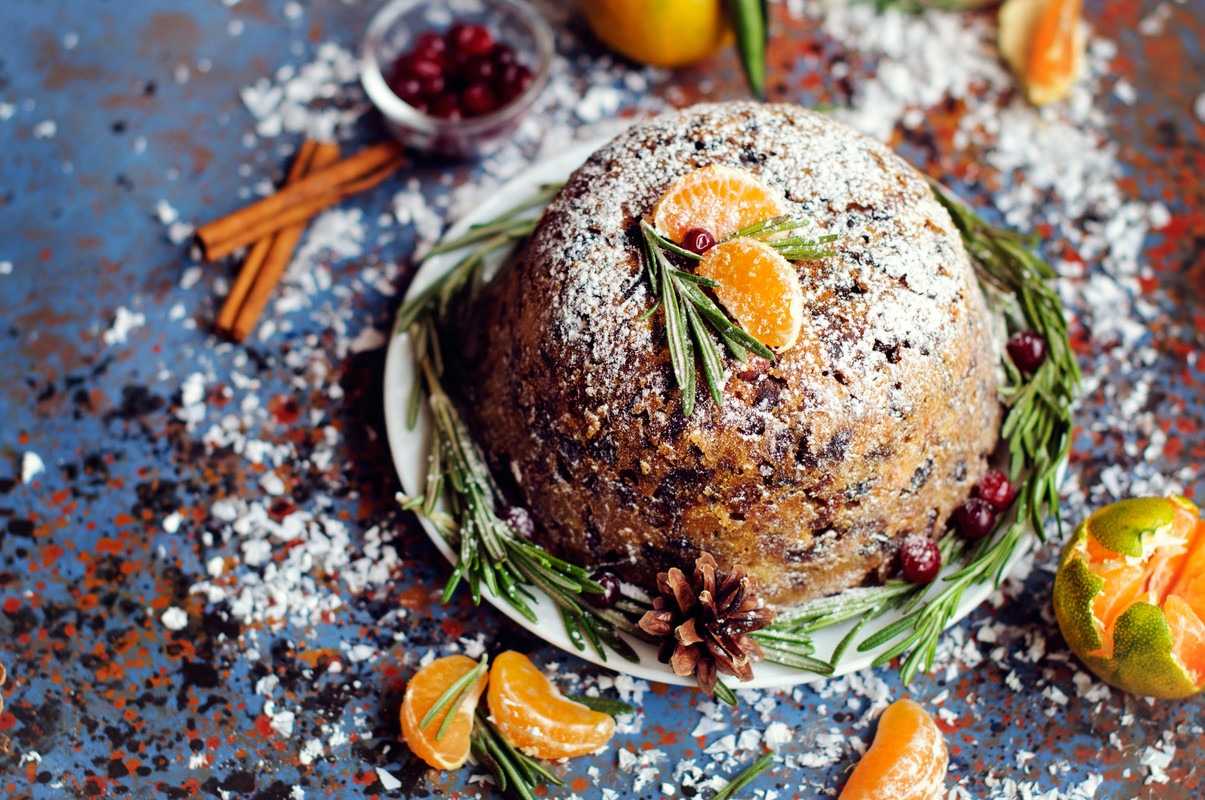
Preparing for “English” Christmas
There is always a lot for me to remember (on top of all the Christmas presents), so to make it easier for my brain, I have created a fool proof check-list. It details the things I’ve picked up that need doing should you want to have Christmas the ‘English’ way
- on December 1st, start the countdown by opening the first advent calendar window
- write 105 Christmas cards (over here, you even hand them out to people you see every day, a verbal Merry Christmas simply won’t do)
- go to see a pantomime (Aladdin for us this year!)
- take the kids to meet Santa at his grotto
- write and post a letter to Santa
- get a Christmas stocking and worry about how to fill it
- Christmas crackers
- remember to pull the turkey’s wishbone, whoever gets the bigger piece, gets to make a wish
- open presents on the morning of December 25th, not midnight on the 24th
- turkey, the main Christmas meal, is served at lunch time but is called Christmas dinner, to be had 25th December
- Christmas cake and Christmas pudding (with brandy sauce; a must!), mince pies (desserts)
- stick a silver coin into the Christmas pudding
- when serving, pour brandy on the Christmas pudding and light it
- make a Christmas pudding at the beginning of advent time, allow each member of family to stir it (from East to the West in honour of the Three Wise men), making a wish
- get holy wreath (find a handsome fella and kiss underneath it, alternatively, a husband will do)
- decorate a Christmas tree
- mulled wine for parents (an essential parents’ survival kit to feel the Christmas spirit, valued highly in my household!)
- cover your house in Christmas lights and decorate it inside and outside
- sing carols (if you have a voice, a CD is used in my case)
- stick a ‘Santa please stop here’ sign outside your front door
- sit by the table with your paper hat and look as if though it was the most normal thing to do for every one is a King on Christmas day!
Michaela Rossi born in the former Czechoslovakia and moved to the UK at the age of 19. She followed her husband on his work assignment to Spain in 2004 where their children were born. In 2011, they moved back to the UK, this time to Hampshire, where they love being outdoors, always admiring the beautiful English countryside and exploring their local area.
In this article series, our contributors share their experiences of spending the holidays abroad, tips on how to combat homesickness during the festive season, and their musings on their favorite time of the year.
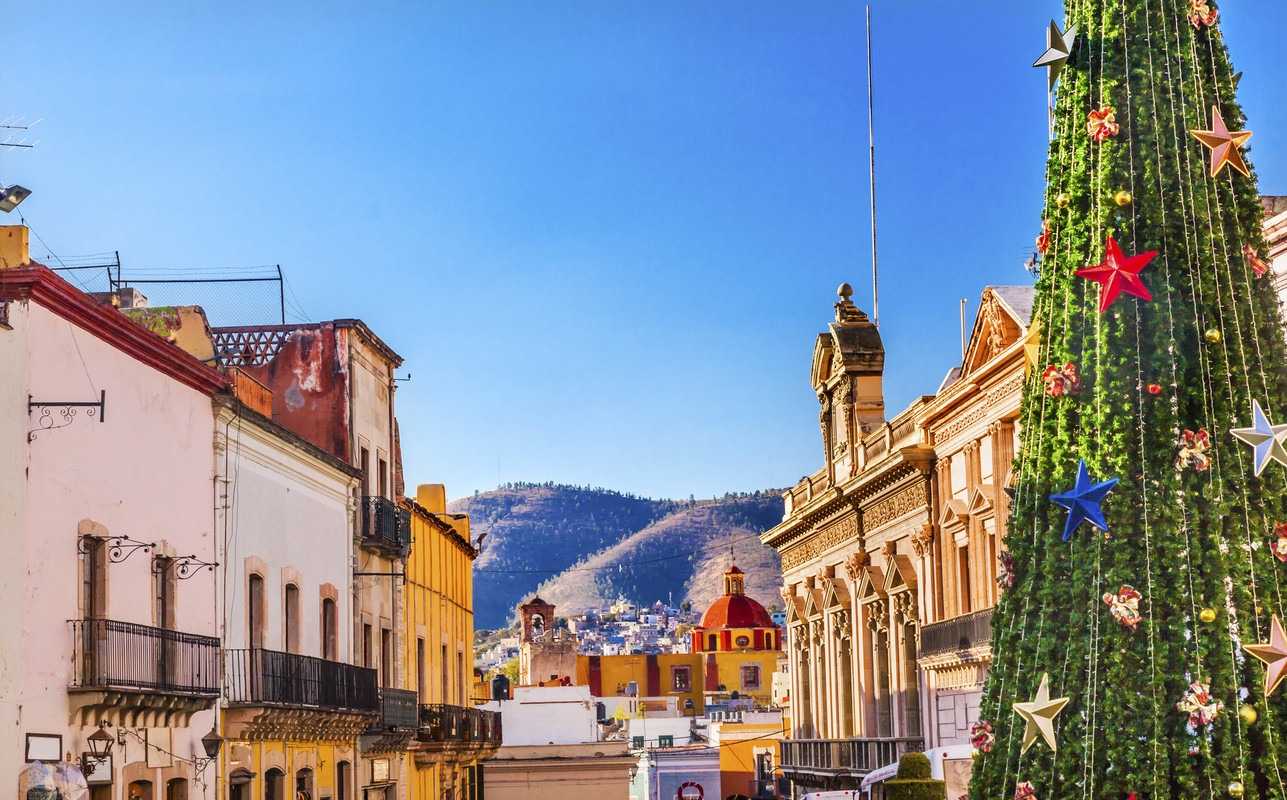
“As so many have done before me, Phoebe the Cat and I arrived in San Miguel de Allende to begin a new life in the Colonial Highlands of old Mexico.” So began my first newspaper column for Aténcion San Miguel on my expat experience.
I did feel quite proud of myself for accomplishing this move on my own, and beginning a new life in a country where I couldn’t speak the language. The truth was, it was exciting as well as challenging. I was the kind of person who felt better about a bad situation if I did something, anything; if I made a decision and went for it. Perhaps even a bad decision was better for me than to feel buffeted by winds and chance. I had been learning these past ten years since my husband’s death that if I wanted something I had to go after it. Nothing wonderful would just fall in my lap.
Bienvenidos
Vicente was waiting for me with his taxi at the Leon airport holding a sign with my name as prearranged by my new landlady. The road to San Miguel was long and dark and Vicente drove carefully, mindful of the topes (speed bumps) in the middle of seemingly nowhere, and the dead animals by the side of the road. The lights of San Miguel gleamed in the distant hills out of the shadowy countryside.
Soon we bumped along on the town’s cobblestones, surrounded by adobe walls and a few old-fashioned colored Christmas lights, and strangely enough, Chinese lanterns. We passed a man in a sombrero and serape in a small plaza, and climbed up the hill and down a miniscule alley, where we stopped in front of a long wall at my new Mexican home. I carried Phoebe and Vicente brought in two suitcases. “But where are the purple bags?” I asked in panic. We searched the car uselessly, frantically.
My carry-on bags never made it out of the Leon Airport in Mexico — the bags where I put everything too important to be checked. I must have turned my attention to Phoebe, and poof, everything changed. And the timing couldn’t have been more poignant – it was right before Christmas.
After getting Phoebe set up with her sandbox and dishes in the downstairs kitchen of our new place and trying to take in that I was now living alone in a foreign country, I searched endlessly through my two remaining bags.
I went to bed but couldn’t sleep. I only tossed and burned with worry about the loss of my irreplaceable belongings. I pictured someone picking up the bags, searching them for things to sell (my jewelry items only, probably), and tossing the rest out the window of a pickup truck on some dusty Mexican road. The image of my family photos blowing through the cactus just made me sick.
The next day my new landlady called the airport for me because as yet I had no Spanish. But the news was bad: no found purple bags. She counseled me to forget it and move on. Easy for her to say in the middle of her Texas mansion plunked down in a garden in a beautiful highland town in Colonial Mexico. Not only did she own her huge hacienda and my apartment, she also had built and rented out a casa and a casita all constructed in the same walled compound. And of course all four dwellings were full of her things. I only had a cat and four suitcases, and now the two most important bags were missing.
This new loss after so many recent losses in my life caused me to mourn for days. I went to lovely St Paul´s, the gringo Protestant church, and prayed to accept the inevitable.
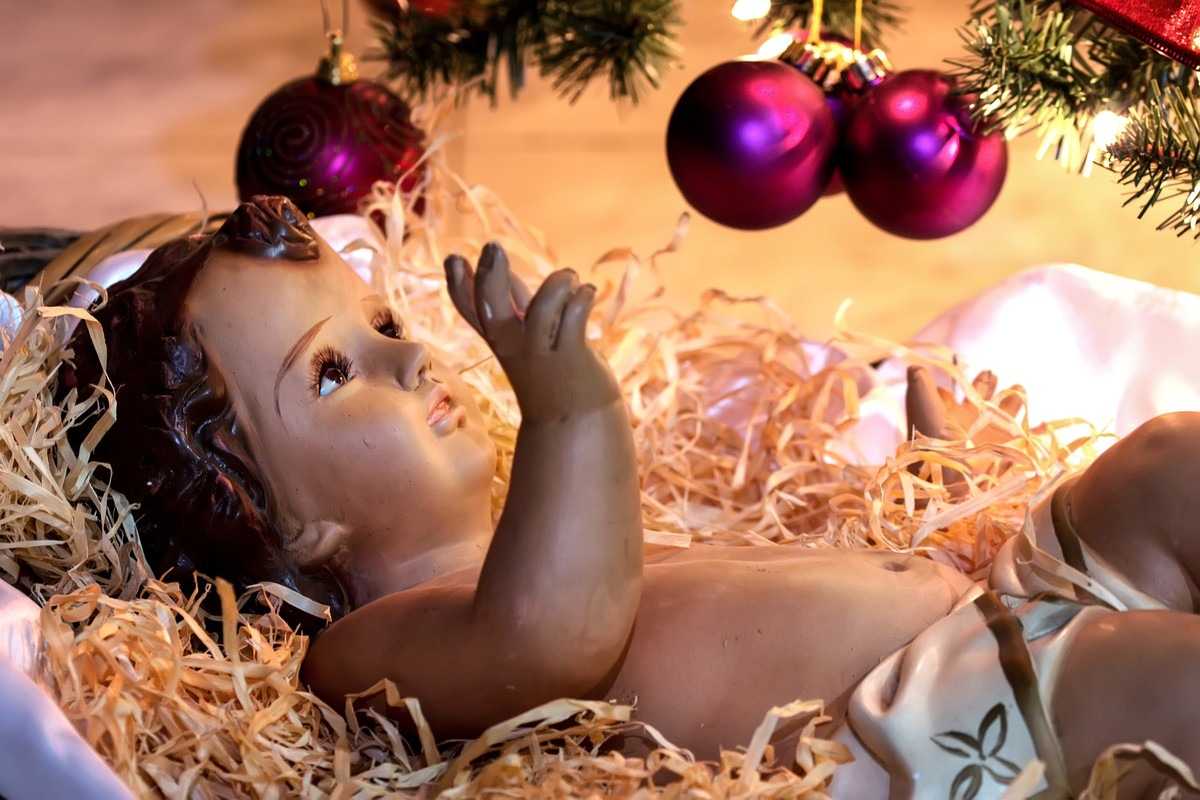
A World of Change
The day of Christmas Eve, the town was full of people carrying baby Jesuses hurriedly through the streets on their way to all the Nativities where the Holy Child would later appear in ceremonies that included rocking Him in cradles of lace to lullabies. Poinsettias, or noche buenas, the largest I had ever seen, were everywhere — in fountains, in hanging baskets, lining stairways and courtyards. In the central Jardin, there was a living Nativity scene in the bandstand, with barnyard animals that children could pet. A tall young man encountered two nuns in their full white habits walking ahead of me on the sidewalk, and kissed their hands. I overheard him say, “Me encanta… me encanta,” and the sisters smiled and laughed, not immune to the charms of a handsome man.
That night I went to a party given by a friend of a friend, and as seems to happen so often in San Miguel, in talking about a problem, help happens. I was learning that serendipity is the way here. At the party I met someone who was leaving the next day for New York from Leon, and she offered to inquire at the airport for me about my bags. I hadn’t gone back myself because of the transportation difficulty — one hour, forty-five minute expensive taxi ride there and back — and my lack of hope in finding them.
I took the bus up to the supermercado on the hill and bought some new underwear and some makeup, although all of the shades were too dark for my very white skin. The bus was decorated with crucifixes and images of Our Lady of Guadalupe, and a boy dusted off the windows at major stops and then collected the fares in a plastic bucket. Gigante was like a surreal American supermarket, where things were kind of familiar, but upon close inspection were totally different. Open bins of sticky candies and pickles, and the smell of fish, strange looking plant things in the produce department, only frozen shrimp, ice cream and ice cubes in the freezer, guards with automatic weapons by the check stands.
The small supermarket in the center of town was more user-friendly, even though the funeral home next door featured a big stack of tiny white satin baby coffins in the display window.
I wore the same pair of earrings every day, but bought a beaded bracelet and necklace from an indigenous woman hawking them over her arm in a restaurant next to the Jardin.
At least I had Phoebe. I certainly would not have traded her for the missing bags, or anything else I didn’t have.
For the first time in my life since the age of twelve, I didn’t have to work. I had no job, no one who expected me nor cancer treatments to show up for as in my recent past. Luckily I wrote travel articles and my column, but had no time clock to punch. Such a strange feeling of freedom, yet purposelessness. My daily mission became finding out where things were, and how to get things done in this new land. I quickly learned that each item on my “to do” list took at least four hours.
After five days, acceptance of the lost suitcases was growing. I figured this was just another lesson in how we don’t need things, how we are here not to accumulate but to live and do. Looking at the poverty around me of the Mexican and indigenous peoples gave me a new perspective. I didn’t really need so many pairs of earrings, how often did I look at those photos anyway, and if my friends wanted to contact me they had my address, even if I didn’t have theirs. It would all work out, and I would be a better person for it.
I was sick and tired of loss, but wasn’t this just another lesson in how to live on my own? We come with nothing, we leave with nothing; we can’t take it with us, possessions are just a burden, etc. All the helpful clichés spun around in my head actually making me feel better.
The Reunion
Early Christmas morning the phone rang: “Cherie, your bags are here!” It was the lady from the party, calling from the airport on her way to New York.
I immediately called Vicente the taxi driver and woke him too. “I’ll be right there!” He felt terrible and unnecessarily guilty about the loss of my luggage. “It was my responsibility, my job,” he moaned in Spanish.
Twenty minutes later we were tearing along the empty Christmas morning road to Leon. At the airport we searched through the lost luggage and my bags weren’t there, although there was a similar purple one and I thought probably that was the one my new friend saw.
Vicente also wanted to check in Customs up by the gate. When we approached, we saw my orphaned bags behind locked doors. There they sat, both of them, like my oldest friends in the world. Traveling unlocked with me on the plane, now they sported plastic security seals. I offered a tip, but the officials waved it away, smiling at the tearful reunion of a gringa and her stuff.
“Gracias, muchas gracias, Feliz Navidad!” I called, walking through the airport hugging my luggage.
Vicente and I laughed all the way back to San Miguel where, after cutting off the plastic locks, I found everything completely untouched.
Getting my things back was a miracle and the best Christmas present I ever received. Those five days without the security blanket of the cherished contents of my bags gave me perspective. I could have managed without them, I had been managing. It had not been the end of the world. I had even learned something about myself. Nevertheless because of the kindness of strangers and a miracle of good luck, I had a very Feliz Navidad in my new hometown, and an incredible Bienvenidos a Mexico.
Vicente invited me to his extended family’s Christmas celebration that night. But that is another story of milagros, magical realism, and me in Mexico.
Written by Cherie Magnus
Advertisement
About Franziska Mutsch
Article topics
Related articles
(Re)Discovering Your Passion Abroad — Diving into the Local Arts and Culture Scene
InterNations member Seraphina Anderson returned to Asia looking for her place in the world. She quickly discovered her passion for the local arts and culture scene in Penang. Read all about how she became a Consul and started introducing expats and global minds to her multicultural city.
How to Enjoy the Holiday Season Away from Home
For some expats, going home for the holidays isn’t an option. Maybe you’ve already been back to your home country recently or you simply can’t get the time off work. Here are a few ways to make the holiday season away from home a little more bearable and a lot more enjoyable.
Be Humble. Adapt.
Moving to the mainland full time was supposed to be a breeze for InterNations member Diana. It came as a shock to her when she initially felt out of place. But with time, she found a way to adapt to the new circumstances and pass on what she learned. This is Diana’s culture shock story!
Does Every Language Need a Word for Heimat?
Heimat — the German word for ‘home’ — has a long and complicated history, but is booming again in German popular culture. This article explores this trend and the deeper meanings, good and bad, of the word behind it. Could it be relevant for all expats today — and why?
Visiting ‘Home’: The Double Life of an Expat
I recently took my very first trip home to England a year after moving to America to live with my American husband in the autumn of 2012. Due to conflicting work schedules, I took the trip alone, leaving my husband in the States while I visited family in England. After establishing a new life abroad, it felt like I was living a double life. I’m sure I’m not the only expat to feel this way.
